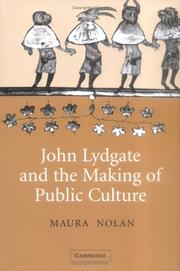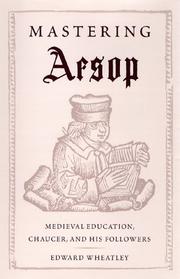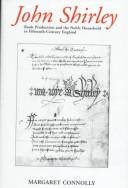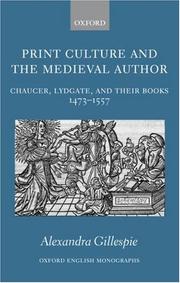| Listing 1 - 10 of 10 |
Sort by
|

ISBN: 9780511483387 9780521852982 9780521115001 0511128126 9780511128127 0511127715 9780511127717 0511127596 9780511127595 0511483384 1280217944 9781280217944 0521852986 1107154553 0511200250 0511300689 0521115000 Year: 2005 Publisher: Cambridge : Cambridge University Press,
Abstract | Keywords | Export | Availability | Bookmark
 Loading...
Loading...Choose an application
- Reference Manager
- EndNote
- RefWorks (Direct export to RefWorks)
Inspired by the example of his predecessors Chaucer and Gower, John Lydgate articulated in his poetry, prose and translations many of the most serious political questions of his day. In the fifteenth century Lydgate was the most famous poet in England, filling commissions for the court, the aristocracy, and the guilds. He wrote for an elite London readership that was historically very small, but that saw itself as dominating the cultural life of the nation. Thus the new literary forms and modes developed by Lydgate and his contemporaries helped shape the development of English public culture in the fifteenth century. Maura Nolan offers a major re-interpretation of Lydgate's work and of his central role in the developing literary culture of his time. Moreover, she provides a wholly new perspective on Lydgate's relationship to Chaucer, as he followed Chaucerian traditions while creating innovative new ways of addressing the public.
Literature and society --- History --- Lydgate, John, --- Lidgate, John --- Lydgate, John --- Lidgate, Iohn --- Monk of Bury --- Monke of Burie --- Monk of Bery --- Criticism and interpretation. --- Arts and Humanities --- Literature
Book
ISBN: 1283836637 1782040579 1843843315 Year: 2012 Publisher: Suffolk : Boydell & Brewer,
Abstract | Keywords | Export | Availability | Bookmark
 Loading...
Loading...Choose an application
- Reference Manager
- EndNote
- RefWorks (Direct export to RefWorks)
John Lydgate is arguably the most significant poet of fifteenth-century England, yet his position as Chaucer's literary successor and his role as a Lancastrian poet have come to overshadow his contributions to English literature. Here, 'fame' is identified as the key to Lydgate's authorial self-fashioning in Chaucer's wake. The author begins by situating Lydgatean fame within the literary, cultural and political landscape of late-medieval England, indicating how Lydgate diverges from Chaucer's treatment of the subject by constructing a more confident model of authorship, according to which poets are the natural makers and recipients of fame. She then discusses the ways in which Lydgate draws on fourteenth-century poetry, the advisory tradition, and the laureate ideology borne out of trecento Italy; she shows that he deploys them to play upon reader anxieties in his short poems on dangerous speech, while depicting poets as the ultimate arbiters of fame in his longer poems and dramatic works. Throughout, the book challenges standard critical positions on questions relating to how poets fit into late-medieval society, how they can be powerful enough to admonish princes, and how English letters fare next to the literature of the continent and of antiquity. Mary C. Flannery is Lecturer in English at the University of Lausanne.
Fame in literature. --- English poetry --- History and criticism. --- Lydgate, John, --- Lidgate, John --- Lydgate, John --- Lidgate, Iohn --- Monk of Bury --- Monke of Burie --- Monk of Bery --- Criticism and interpretation.
Book
ISBN: 0710066465 9780429198205 0429198205 9780429584282 0429584288 9780429582387 0429582382 9780429580161 0429580169 9780710066466 Year: 1970 Publisher: London Routledge and Kegan Paul
Abstract | Keywords | Export | Availability | Bookmark
 Loading...
Loading...Choose an application
- Reference Manager
- EndNote
- RefWorks (Direct export to RefWorks)
Lydgate, John --- Civilization, Medieval, in literature --- Lydgate, John, --- Criticism and interpretation --- -Criticism and interpretation --- Lidgate, John, --- Lidgate, Iohn, --- Monk of Bury, --- Monke of Burie, --- Monk of Bery, --- Criticism and interpretation. --- Lidgate, John --- Lidgate, Iohn --- Monk of Bury --- Monke of Burie --- Monk of Bery --- Lydgate, John, - 1370?-1451? - Criticism and interpretation --- Lydgate, John, - 1370?-1451?
Book
ISBN: 131711860X 1317118596 1283015188 9786613015181 1409406326 9781409406327 9781317118596 9781283015189 9781409406310 9781315587912 9781317118589 1409406318 1315587912 Year: 2011 Publisher: Farnham Burlington, VT Ashgate
Abstract | Keywords | Export | Availability | Bookmark
 Loading...
Loading...Choose an application
- Reference Manager
- EndNote
- RefWorks (Direct export to RefWorks)
Through a series of close readings of selected short poems and Lydgate's Troy Book, Fall of Princes, and Siege of Thebes and of Hoccleve's Regiments of Princes and Series, Smyth looks at expressions of time and examples of the authors' negotiation of time consciousness, illustrating how both poets manipulate a range of cultural narratives of time in order to create multiple and sometimes competing temporalities within a single poem.
Time in literature. --- Lydgate, John, --- Hoccleve, Thomas, --- Occleve, Thomas, --- Hoccleue, Thomas, --- Lidgate, John --- Lydgate, John --- Lidgate, Iohn --- Monk of Bury --- Monke of Burie --- Monk of Bery --- Criticism and interpretation.
Book
ISBN: 0812209478 0812245954 1322512906 Year: 2014 Publisher: Philadelphia : University of Pennsylvania Press,
Abstract | Keywords | Export | Availability | Bookmark
 Loading...
Loading...Choose an application
- Reference Manager
- EndNote
- RefWorks (Direct export to RefWorks)
No medieval writer reveals more about early English drama than John Lydgate, Claire Sponsler contends. Best known for his enormously long narrative poems The Fall of Princes and The Troy Book, Lydgate also wrote numerous verses related to theatrical performances and ceremonies. This rich yet understudied body of material includes mummings for London guildsmen and sheriffs, texts for wall hangings that combined pictures and poetry, a Corpus Christi procession, and entertainments for the young Henry VI and his mother. In The Queen's Dumbshows, Sponsler reclaims these writings to reveal what they have to tell us about performance practices in the late Middle Ages. Placing theatricality at the hub of fifteenth-century British culture, she rethinks what constituted drama in the period and explores the relationship between private forms of entertainment, such as household banquets, and more overtly public forms of political theater, such as royal entries and processions. She delineates the intersection of performance with other forms of representation such as feasts, pictorial displays, and tableaux, and parses the connections between the primarily visual and aural modes of performance and the reading of literary texts written on paper or parchment. In doing so, she has written a book of signal importance to scholars of medieval literature and culture, theater history, and visual studies.
Theater --- English drama --- English literature --- History --- History and criticism. --- Lydgate, John, --- Lidgate, John --- Lydgate, John --- Lidgate, Iohn --- Monk of Bury --- Monke of Burie --- Monk of Bery --- Criticism and interpretation. --- Cultural Studies. --- Literature. --- Medieval and Renaissance Studies.
Book
ISBN: 9781843843245 1843843242 9781846159770 9786613834881 1846159776 1283522438 Year: 2012 Publisher: Suffolk : Boydell & Brewer,
Abstract | Keywords | Export | Availability | Bookmark
 Loading...
Loading...Choose an application
- Reference Manager
- EndNote
- RefWorks (Direct export to RefWorks)
Offers an impressive vision of a militaristic culture and its thinking, reading and writing. This is war as political and economic practice - the continuation of politics by other means A major contribution to the literary history of the fifteenth century.' Professor Daniel Wakelin, University of Oxford. Reading, writing and the prosecution of warfare went hand in hand in the fifteenth century, demonstrated by the wide circulation and ownership of military manuals and ordinances, and the integration of military concerns into a huge corpus of texts; but their relationship has hitherto not received the attention it deserves, a gap which this book remedies, arguing that the connections are vital to the literary culture of the time, and should be recognised on a much wider scale. Beginning with a detailed consideration of the circulation of one of the most important military manuals in the Middle Ages, Vegetius' De re militari, it highlights the importance of considering the activities of a range of fifteenth-century readers and writers in relation to the wider contemporary military culture. It shows how England's wars in France and at home, and the wider rhetoric and military thinking those wars generated, not only shaped readers' responses to their texts but also gave rise to the production of one of the most elaborate, rich and under-recognised pieces of verse of the Wars of the Roses in the form of Knyghthode and Bataile. It also indicates how the structure, language and meaning of canonical texts, including those by Lydgate and Malory, were determined by the military culture of the period. Catherine Nall is Lecturer in Medieval Literature at Royal Holloway, University of London.
English literature --- War in literature. --- History and criticism. --- Lydgate, John, --- Malory, Thomas, --- Criticism and interpretation. --- Mėlori, Tomas, --- Lidgate, John --- Lydgate, John --- Lidgate, Iohn --- Monk of Bury --- Monke of Burie --- Monk of Bery --- Littérature et guerre --- Art et science militaires --- Grande-Bretagne --- 15e siècle --- Manuels d'enseignement --- Histoire et critique --- Annotating. --- Discourse Community. --- Fifteenth Century. --- Military Culture. --- Rewriting. --- Translating. --- War as Political and Economic Practice. --- Warfare.

ISBN: 0813024137 9780813024134 0813017459 Year: 2000 Publisher: Gainesville, Fla. : University Press of Florida,
Abstract | Keywords | Export | Availability | Bookmark
 Loading...
Loading...Choose an application
- Reference Manager
- EndNote
- RefWorks (Direct export to RefWorks)
"In this first study of a text from the primary school canon, Edward Wheatley examines fable as a mode of discourse in its medieval curricular context and then discusses the ways in which it influenced the work of Chaucer, Lydgate, and Henryson."--Jacket.
English literature --- Fables, Greek --- Fables, English --- Education, Medieval --- Animals in literature. --- Animals in literature --- English --- Languages & Literatures --- English Literature --- Education --- Medieval education --- Seven liberal arts --- Civilization, Medieval --- Learning and scholarship --- Greek fables --- British literature --- Inklings (Group of writers) --- Nonsense Club (Group of writers) --- Order of the Fancy (Group of writers) --- History and criticism. --- Adaptations --- Greek influences. --- History and criticism --- Greek influences --- History --- Chaucer, Geoffrey, --- Lydgate, John, --- Henryson, Robert, --- Aesop --- Aesopus --- Ezop --- Esop --- Esopo --- Esope --- Aisōpos --- Esopus --- Ezovbos --- Ezopos --- Īcāp --- Isop --- אזוף --- אזופוס --- איסופוס --- עזאפ --- イソップ --- 伊索 --- Lidgate, John --- Lydgate, John --- Lidgate, Iohn --- Monk of Bury --- Monke of Burie --- Monk of Bery --- Knowledge --- Literature. --- Appreciation --- Influence. --- Aesop's fables. --- Aisōpou mythoi --- Fables of Aesop --- Fabulae Aesopi --- Īcāp kataikaḷ --- Aesop in Mexico --- Μῦθοι (Aesop's fables) --- Mythoi (Aesop's fables) --- Corpus Fabularum Aesopicarum --- Aesopi --- Äsop

ISBN: 1859284620 Year: 1998 Publisher: Aldershot ; Brookfield (USA) ; Singapore ; Syndney Ashgate
Abstract | Keywords | Export | Availability | Bookmark
 Loading...
Loading...Choose an application
- Reference Manager
- EndNote
- RefWorks (Direct export to RefWorks)
Shirley, John --- English manuscripts (Middle) --- Handschriften [Engelse ] (Middel) --- Manuscripts [English ] (Middle) --- Manuscripts [Middle English ] --- Manuscrits anglais (Moyen) --- Middle English manuscripts --- 091 SHIRLEY, JAMES --- 091 <41> --- 091 =20 --- Handschriftenkunde. Handschriftencatalogi--SHIRLEY, JAMES --- Handschriftenkunde. Handschriftencatalogi--Verenigd Koninkrijk van Groot-Brittannië en Noord-Ierland --- Handschriftenkunde. Handschriftencatalogi--Engels --- Books --- English poetry --- Literature publishing --- Literature, Medieval --- Manuscripts, English (Middle) --- Nobility --- Scribes --- Scriptoria --- Translators --- History --- Criticism, Textual. --- History. --- Translations into English --- Books and reading --- Biography. --- 091 =20 Handschriftenkunde. Handschriftencatalogi--Engels --- 091 <41> Handschriftenkunde. Handschriftencatalogi--Verenigd Koninkrijk van Groot-Brittannië en Noord-Ierland --- 091 SHIRLEY, JAMES Handschriftenkunde. Handschriftencatalogi--SHIRLEY, JAMES --- Manuscripts, English (Middle). --- Copying rooms --- Writing rooms --- Rooms --- Illumination of books and manuscripts --- Manuscripts --- Monasteries --- Monastic libraries --- Copyists --- Noble class --- Noble families --- Nobles (Social class) --- Peerage --- Upper class --- Aristocracy (Social class) --- Titles of honor and nobility --- Manuscripts, Middle English --- Literary publishing --- Literature --- Publishers and publishing --- European literature --- Medieval literature --- English literature --- Library materials --- Publications --- Bibliography --- Cataloging --- International Standard Book Numbers --- Criticism, Textual --- Translations into English&delete& --- Books and reading&delete& --- Biography --- Reproduction --- Publishing --- Beauchamp, Richard de, --- Chaucer, Geoffrey, --- Lydgate, John, --- Shirley, John, --- Lidgate, John, --- Lidgate, Iohn, --- Monk of Bury, --- Monke of Burie, --- Monk of Bery, --- Chaucer, Jeffrey, --- Chʻiao-sou, Chieh-fu-lei, --- Chieh-fu-lei Chʻiao-sou, --- Choser, Dzheffri, --- Choser, Zheoffreĭ, --- Cosvr, Jvoffrvi, --- Tishūsar, Zhiyūfrī, --- Beauchamp, Richard, --- De Beauchamp, Richard, --- Warwick, Richard de Beauchamp, --- Friends and associates. --- Manuscripts. --- Great Britain --- England --- Lancaster and York, 1399-1485 --- Scribes - Great Britain - Biography. --- Beauchamp, Richard de, - Earl of Warwick, - 1382-1439 - Friends and associates. --- Chaucer, Geoffrey, - d. 1400 - Manuscripts. --- Lydgate, John, - 1370?-1451? - Manuscripts. --- English poetry - Middle English, 1100-1500 - Criticism, Textual. --- Literature, Medieval - Translations into English - Criticism, Textual. --- Nobility - Books and reading - England - History. --- Literature publishing - England - History. --- Translators - Great Britain - Biography. --- Books - England - History - 1400-1600. --- Lidgate, John --- Lydgate, John --- Lidgate, Iohn --- Monk of Bury --- Monke of Burie --- Monk of Bery

ISBN: 1280759186 0191514659 1429460229 9781429460224 9780191514654 9781280759185 0199262950 9780199262953 138304046X Year: 2023 Publisher: Oxford : Oxford University Press,
Abstract | Keywords | Export | Availability | Bookmark
 Loading...
Loading...Choose an application
- Reference Manager
- EndNote
- RefWorks (Direct export to RefWorks)
Examining hundreds of early printed books containing works by Chaucer, the 'father' of English poetry, and his much-maligned follower, John Lydgate. She demonstrates that the shift from manuscript to print was part of the controversial process by which Chaucer earned his exclusive place in English literary history.
Printing
---
Books
---
Transmission of texts
---
Literary transmission
---
Manuscript transmission
---
Textual transmission
---
Criticism, Textual
---
Editions
---
Manuscripts
---
Early printed books
---
Incunabula
---
History
---
Origin and antecedents.
---
History.
---
Chaucer, Geoffrey,
---
Lydgate, John,
---
Chaucer, Jeffrey,
---
Chʻiao-sou, Chieh-fu-lei,
---
Chieh-fu-lei Chʻiao-sou,
---
Choser, Dzheffri,
---
Choser, Zheoffreĭ,
---
Cosvr, Jvoffrvi,
---
Tishūsar, Zhiyūfrī,
---
Lidgate, John
---
Lydgate, John
---
Lidgate, Iohn
---
Monk of Bury
---
Monke of Burie
---
Monk of Bery
---
Criticism and interpretation.
---
093.1 <41 LONDON>
---
093 CHAUCER, GEOFFREY
---
094.1 <41>
---
094 CHAUCER, GEOFFREY
---
820 "14"
---
820 "14" Engelse literatuur--?"14"
---
Engelse literatuur--?"14"
---
094 CHAUCER, GEOFFREY Oude en merkwaardige drukken. Kostbare en zeldzame boeken. Preciosa en rariora--CHAUCER, GEOFFREY
---
Oude en merkwaardige drukken. Kostbare en zeldzame boeken. Preciosa en rariora--CHAUCER, GEOFFREY
---
094.1 <41> Oude drukken: bibliografie--
Book
ISBN: 0812248651 0812293673 Year: 2017 Publisher: Philadelphia : University of Pennsylvania Press,
Abstract | Keywords | Export | Availability | Bookmark
 Loading...
Loading...Choose an application
- Reference Manager
- EndNote
- RefWorks (Direct export to RefWorks)
What does it mean to speak for nature? Contemporary environmental critics warn that giving a voice to nonhuman nature reduces it to a mere echo of our own needs and desires; they caution that it is a perverse form of anthropocentrism. And yet nature's voice proved a powerful and durable ethical tool for premodern writers, many of whom used it to explore what it meant to be an embodied creature or to ask whether human experience is independent of the natural world in which it is forged.The history of the late medieval period can be retold as the story of how nature gained an authoritative voice only to lose it again at the onset of modernity. This distinctive voice, Kellie Robertson argues, emerged from a novel historical confluence of physics and fiction-writing. Natural philosophers and poets shared a language for talking about physical inclination, the inherent desire to pursue the good that was found in all things living and nonliving. Moreover, both natural philosophers and poets believed that representing the visible world was a problem of morality rather than mere description. Based on readings of academic commentaries and scientific treatises as well as popular allegorical poetry, Nature Speaks contends that controversy over Aristotle's natural philosophy gave birth to a philosophical poetics that sought to understand the extent to which the human will was necessarily determined by the same forces that shaped the rest of the material world.Modern disciplinary divisions have largely discouraged shared imaginative responses to this problem among the contemporary sciences and humanities. Robertson demonstrates that this earlier worldview can offer an alternative model of human-nonhuman complementarity, one premised neither on compulsory human exceptionalism nor on the simple reduction of one category to the other. Most important, Nature Speaks assesses what is gained and what is lost when nature's voice goes silent.
Nature in literature. --- Poetry, Medieval --- English literature --- Philosophy of nature in literature. --- Literature and science --- Religion and science --- Nature in poetry --- Christianity and science --- Geology --- Geology and religion --- Science --- Science and religion --- Poetry and science --- Science and literature --- Science and poetry --- Science and the humanities --- History and criticism. --- History. --- Religious aspects --- Aristotle --- Jean, --- Guillaume, --- Chaucer, Geoffrey, --- Lydgate, John, --- Lidgate, John --- Lydgate, John --- Lidgate, Iohn --- Monk of Bury --- Monke of Burie --- Monk of Bery --- Chaucer, Jeffrey, --- Chʻiao-sou, Chieh-fu-lei, --- Chieh-fu-lei Chʻiao-sou, --- Choser, Dzheffri, --- Choser, Zheoffreĭ, --- Cosvr, Jvoffrvi, --- Tishūsar, Zhiyūfrī, --- Deguileville, Guillaume de, --- Guillaume de Deguilleville, --- Guillelmo, --- Guillermo, --- William, --- Digulleville, Guillaume de, --- Guilleuila, Guillelmo de, --- Guillevila, Guillelmo de, --- Guilleville, Guillaume de, --- Gralleville, Guillermo de, --- Guillermus, --- Chopinel, Jean, --- Clopinel, Jean, --- De Meun, Jean, --- Jean Chopinel de Meun, --- Jean Clopinel de Meun, --- Jean de Meun, --- Jehan, --- Meun, Jean de, --- Clopinel, J. --- Aristoteles --- Aristote --- Arisṭāṭṭil --- Aristo, --- Aristotel --- Aristotele --- Aristóteles, --- Aristòtil --- Aristotile --- Arisṭū --- Arisṭūṭālīs --- Arisutoteresu --- Arystoteles --- Ya-li-shih-to-te --- Ya-li-ssu-to-te --- Yalishiduode --- Yalisiduode --- Ἀριστοτέλης --- Αριστοτέλης --- Аристотел --- ארסטו --- אריםטו --- אריסטו --- אריסטוטלס --- אריסטוטלוס --- אריסטוטליס --- أرسطاطاليس --- أرسططاليس --- أرسطو --- أرسطوطالس --- أرسطوطاليس --- ابن رشد --- اريسطو --- Pseudo Aristotele --- Pseudo-Aristotle --- アリストテレス --- Influence. --- Criticism and interpretation. --- Knowledge --- Science. --- Romaunt of the Rose.
| Listing 1 - 10 of 10 |
Sort by
|

 Search
Search Feedback
Feedback About
About Help
Help News
News